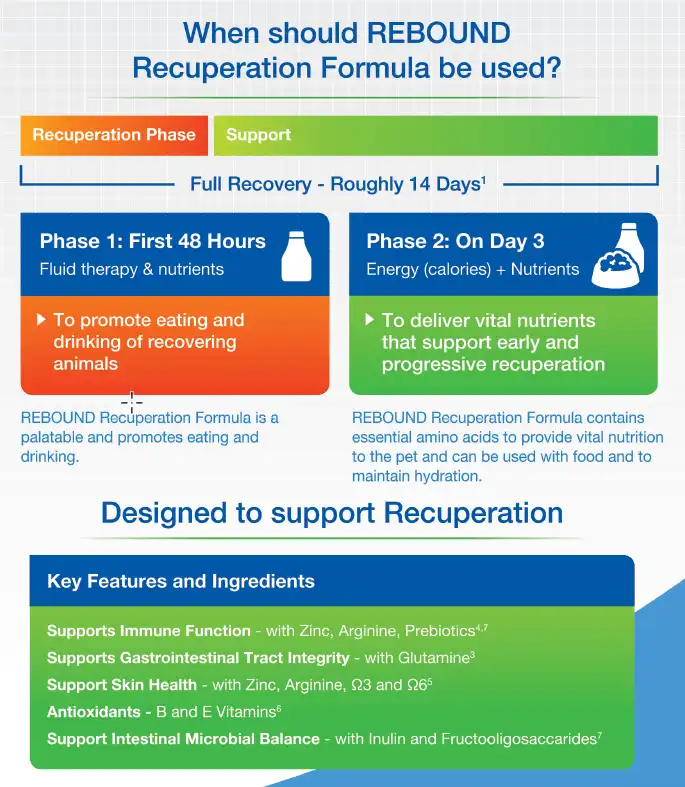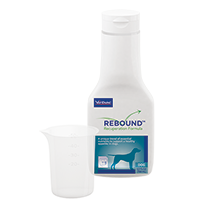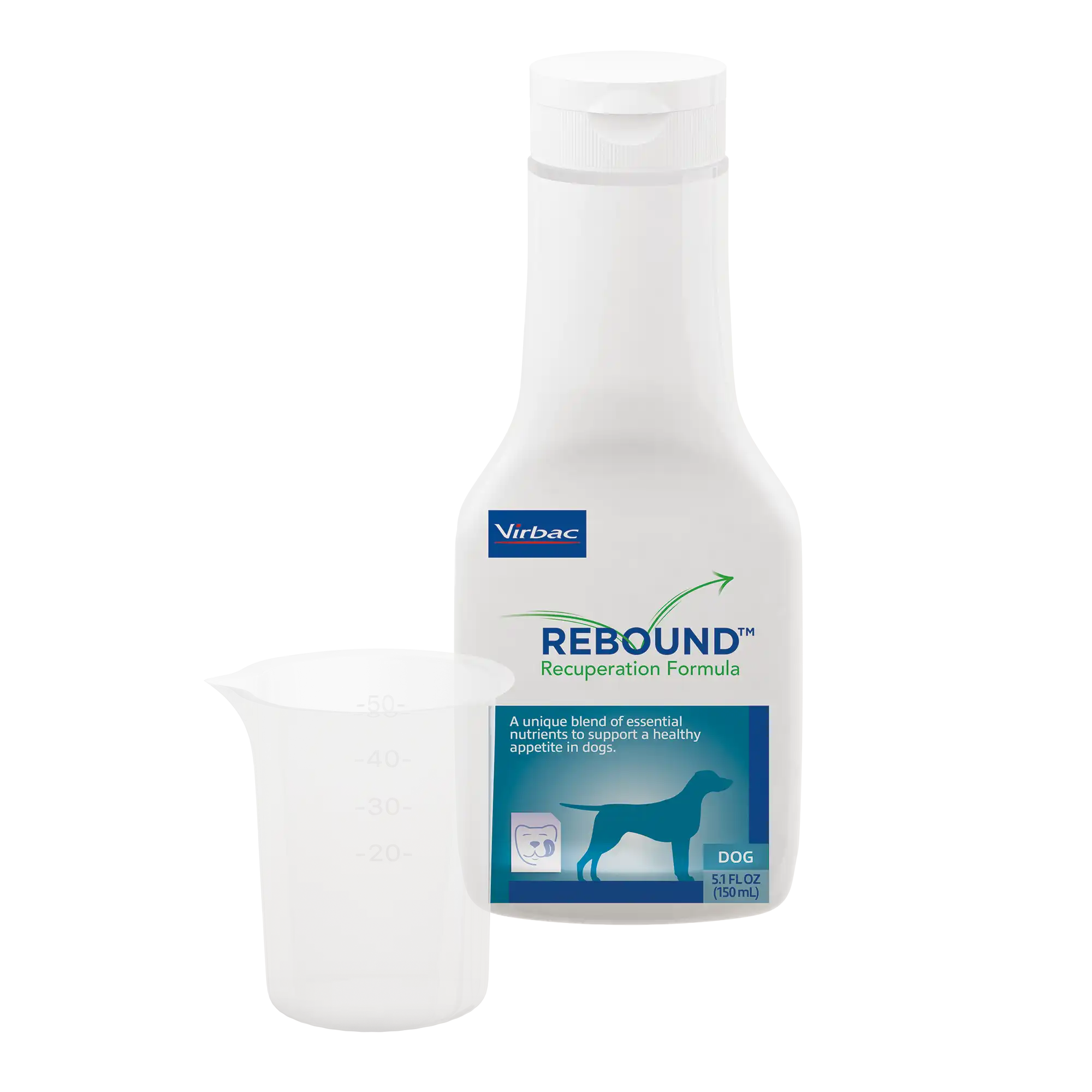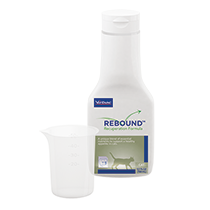REBOUND® Recuperation Formula
Your solution for hydration, recuperation, and nutritional support of dogs and cats.
- Palatable liquid formulation designed to help promote eating and drinking, help support the immune system, and feeds the gut during the recovery period

- Ready-to-use bottle (5.1 oz); lasts 3-5 days depending on size of patient; use in hospital or at home; once opened stable in refrigerator for 7 days
- Low calorie, specific formulas for dogs and cats without age restriction
- May be given with food, with water, on its own, or syringe fed
- Can be purchased singly, or in a case of 12 dog or 12 cat
- Rebound™ Recuperation is NOT a critical care liquid diet; it is a nutritional supplement that is intended for intermittent or supplemental feeding only
- Great supplement for use in shelters for malnourished dogs/cats especially puppies and kittens
"In my clinic, I saw cats and dogs that were eating and drinking less or even refusing everything (hyporectic or anorectic animals) on a daily basis. This was due to a disease or a surgery. If they don’t eat, we know that we don’t feed the gut with intraluminal nutrients, important to support the functioning of the immune system. Especially glutamine, arginine, taurine and omega 3 fatty acids are seen as nutrients that will recuperate the animal faster and better. Can a pet recuperate faster and better after illness or surgery when they don’t eat and drink? Enteral feeding must be our preferred choice."
"I also realized that pet owners are judging the work of the vet clinic on the fact that their beloved animal, once home after visiting the vet clinic, needs to eat and drink well. A product that is so palatable that even sick animals will spontaneously eat, will provide a solution for vet, animal and pet owner at home. Our clients will be happy to provide something to their animal at home. They will not see problems in eating and drinking. This will also increase the image of the vet clinic to their clients in terms of quality and professionalism. Such a product need to be implemented in every protocol where there is a risk of refusing to eat and drink, seen when the animal is in a catabolic state. The list of diseases and medicines in humans that affect smell and taste is long and we can also apply this list to our cats and dogs."
Dr. Wim Van Kerkhoven, DVM
References:
- Ronald J. Corbee, Wim J. S. Van Kerkhoven. Nutritional Support of Dogs and Cats after Surgery or Illness, Open Journal of Veterinary Medicine, April 2014, 4, 44-57.
- Delzenne NM, et al. Am J Clin Nutr 1993; 57(suppl 5): S820.
- Greenfield, J.R., Farooqi, I.S., Keogh, J.M., Henning, E., Habib, A.M., Blackwood, A., Reimann, F., Holst, J.J. and Gribble, F.M. (2009) Oral Glutamine Increases Circulating Glucagon-Like Peptide 1, Glucagon, and Insulin Concentrations in Lean, Obese, and Type 2 Diabetic Subjects. American Journal of Clinical Nutrition, 89, 106-113. ; also it contributes to the synthesis of glutathione aiding in the prevention of bacterial translocation.
- Freeman LM. Beneficial effects of omega-3 fatty acid in cardiovascular disease. Journal of Small Animal Practice 2010; 51: 462-470.Freeman LM. Beneficial effects of omega-3 fatty acid in cardiovascular disease. Journal of Small Animal Practice 2010; 51: 462-470.
- Goffschlich, M.M., Jenkins, M., Warden, G.D., Baumer, T., Havens, P., Snook, J.T. and Alexander, J.W. (1990) Differential. Effects of Three Dietary Regimens on Selected Outcome Variables in Burn Patients. JPEN Journal of Parenteral and Enteral Nutrition, 14, 225-236.
- Redmond, H.P., Stapleton, P.P., Neary, P. and Bouchier-Hayes, D. (1998) Immunonutrition: The Role of Taurine. Nutrition,14, 599-604.
- Hussein S. Hussein, Elizabeth A. Flickinger and George C. Fahey, Jr. (1999) Petfood Applications of Inulin and Oligofructose. The Journal of Nutrition Vol. 129 (7) 1454s-1456s.
INGREDIENTS:
Water, spray dried chicken liver, Poultry broth (concentrate), Poultry fat, Maltodextrins, Lecithin, Rapeseed oil, Modified corn starch, Powdered cellulose, Inulin, Fructooligosaccharide, Guar gum, Xanthan gum, Taurine, Vitamin A Supplement, Choline Chloride, Vitamin E Supplement, Thiamine Mononitrate (source of vitamin B1), Niacin, Riboflavin (source of vitamin B2), Pyridoxine Hydrochloride (source of vitamin B6), Vitamin D3 Supplement, Vitamin B12 Supplement, Folic Acid, Biotin, Calcium Carbonate, Potassium Carbonate, Sodium Tripolyphosphate, Ferrous Sulfate, Zinc Sulfate, Manganese Sulfate.
![23_icon_dark.webp]() Shop Virbac at Vetcove
Shop Virbac at Vetcove
You can shop all Virbac products on Vetcove and connect your distributor accounts to purchase and access rewards.
Pet Owner Information:
We have a separate site specifically tailored to pet owners with all the information you need to ensure your pets are taken care of to the highest degree! Click here to view this product's page on our pet owner website!
your pets are taken care of to the highest degree! Click here to view this product's page on our pet owner website!
GUARANTEED ANALYSIS (per 30mL):
- Crude Protein (min.) 2.5%
- Crude Fat (min.) 2.0%
- Crude Fiber (max.) 0.5%
- Moisture (max.) 88%
- Arginine (min.) 0.14%
- Lysine (min.) 0.1%
- Methionine (min.) 0.05%
- Phenylalanine (min.) 0.08%
- Linoleic acid (min.) 0.3%
- Alpha-linolenic acid (min.) <0.1%
- EPA (min.) <0.1%
- DHA (min.) <0.1%
- Calcium (min.) 0.2%
- Iron (min.) 0.31 mg
- Manganese (min.) 0.08 mg
- Zinc (min.) 0.21 mg
- Vitamin A (min.) 76 IU
- Vitamin D3 (min.) 4 IU
- Vitamin E (min.) 2 IU
- Thiamine (min.) 0.12 mg
- Riboflavin (min.) 0.11 mg
- Pantothenic acid (min.) 0.09 mg
- Niacin (min.) 0.23 mg
- Vitamin B6 (min.) 0.46 mg
- Folic acid (min.) 0.01 mg
- Vitamin B12 (min.) 0.003 mg
- Choline (min.) 15.29 mg.
- Biotin (min.) 0.003 mg
- Not recognized as an essential nutrient by the AAFCO Dog Food Nutrient Profiles
- Glutamine (min.) 0.31%
- Not recognized as an essential nutrient by the AAFCO Dog Food Nutrient Profiles.
- Taurine (min.) 0.1%
- Not recognized as an essential nutrient by the AAFCO Dog Food Nutrient Profiles.


